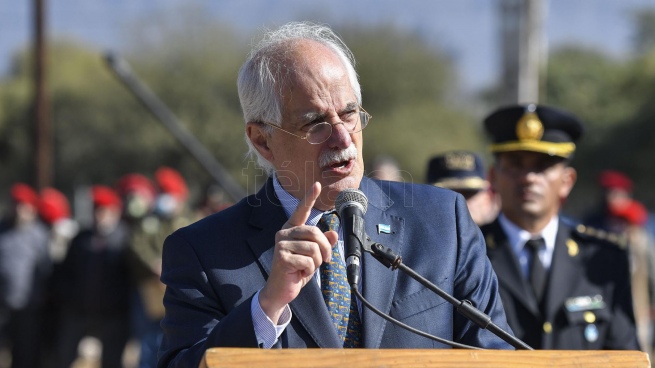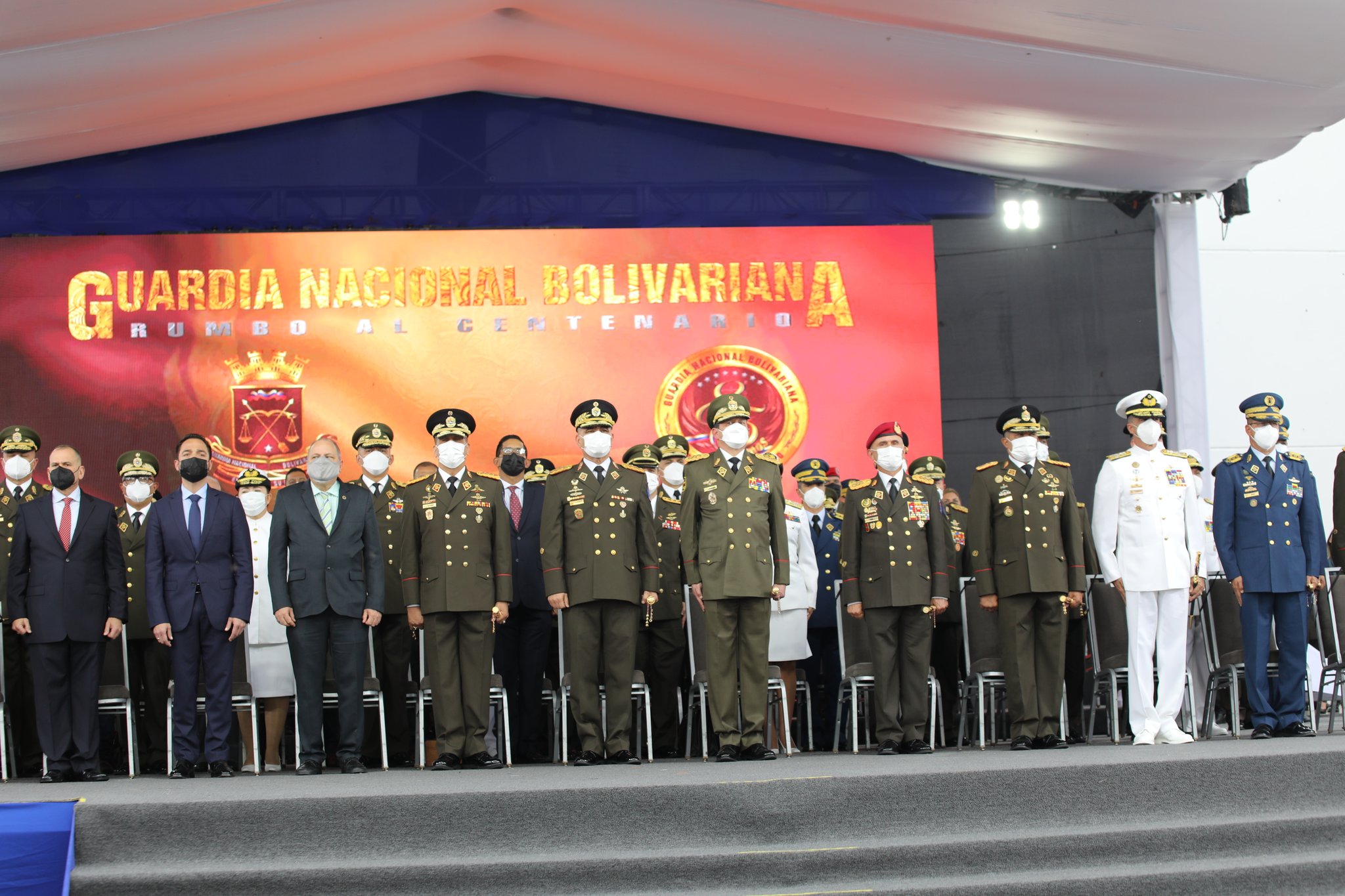The Minister of Defense, Jorge Taiana, ordered the compulsory discharge from the ranks of the Argentine Navy of six soldiers with sentences of Firm conviction for crimes against humanity committed during the last civic-military dictatorshipa measure that was highlighted by human rights organizations and the head of Inadi, Victoria Donda.
The military portfolio removed the military state from the repressors Adolfo Miguel Donda, Ricardo Miguel Cavallo, Alberto Eduardo González, Jorge Carlos Radice, Jorge Eduardo Acosta and Antonio Perníaswhich belonged to task group 3.3 of the Navy Mechanics School (Esma), was reported in a statement from the Ministry of Defense.
“The Federal Oral Criminal Court No. 5 of the Autonomous City of Buenos Aires, in charge of the case, notified the Ministry of Defense once the sentence was finalized to act as provided in Law No. 19,101 to Military Personnel that establishes the mandatory discharge of those convicted as a result of the sentence of absolute and perpetual disqualification imposed by a final sentence,” reported the ministry that Taiana leads.
Also, it was highlighted that The decision is part of the commitment made by the Ministry of Defense to implement a policy of respect for human rights and integration of the Armed Forces with civil societywhere “it is unacceptable and contrary to law that there are personnel with military status who are, at the same time, convicted of crimes against humanity.”
Tailor-made support
In this sense, the head of the National Institute against Discrimination, Xenophobia and Racism (Inadi), Victoria Donda, said in statements to Télam that she feels “proud to be part of a State that dismisses these servants of the concentrated powers that used the most violent weapons that Argentine society has known”.
In this context, he recalled that Adolfo Miguel Donda, in addition to being his uncle, was “one of those responsible for the Army Mechanics School where I was born, for the torture of my mother while she was pregnant with me, who was his sister-in-law and I was his niece.”
“The fact that he is discharged continues the path of our Armed Forces to build itself as an institution within the democratic system and at the service of Argentine society,” Donda said.
The official pointed out that although the measure “was a long time coming,” she stressed that “the justice that was managed to be built from society has long condemned those who, from the State, committed these unforgivable crimes against humanity.”
The former chief of operations of task group 3.3.2, Adolfo Donda, is the brother of José María Donda and brother-in-law of María Hilda Pérez, both detainees who disappeared during the last civic-military dictatorship and parents of the current head of Inadi, who was born in captivity. in the illegal detention center that operated in the Esma.
“The fact that he is discharged continues with a path of our Armed Forces to build itself as an institution within the democratic system and at the service of Argentine society”Victoria Donda
Also, Various human rights organizations celebrated the decision of the Minister of Defense to discharge the six convicted soldiers and recalled that “these genocidaires maintain the pacts of silence that prevent us from knowing where the bodies of the thousands of victims are”.
This was expressed through a statement from Grandmothers of the Plaza de Mayo, Mothers of the Plaza de Mayo, Founding Line, Relatives of the Disappeared and Detained for Political Reasons, HIJOS Capital, the Permanent Assembly for Human Rights, among other organizations.
In the note they pointed out that these soldiers are also part of those who “continue to commit the crime of appropriation and substitution of identity of sons and daughters of victims of forced disappearances that we are still looking for”.
And they added: “We hope that the measure will be extended to all those convicted with a final sentence for crimes against humanity.”
We welcome the minister’s decision @JorgeTaiana ordering the discharge of “six soldiers with a final conviction for crimes against humanity committed during the last military dictatorship,” according to a statement issued today by the @MindefArg https://t.co/mn6L1zLosn
— Pallottines for Memory, Truth and Justice (@palotinosxmvj) August 4, 2022
“The civil control of the armed forces must guarantee the effective dismissal of all those responsible for serious human rights violations,” concludes the statement also signed by Relatives and Companions of the 12 of the Holy Cross, Permanent Assembly for Human Rights La Matanza, Center for Legal and Social Studies, Ecumenical Movement for Human Rights –MEDH, Argentine League for Human Rights, Truth and Justice Memory Commission, North Zone, Argentine Historical and Social Memory Foundation, and Good Memory Association.
Along the same lines, the group Palotinos por la Memoria, la Verdad y la Justicia celebrated on its Twitter social network account “Minister Jorge Taiana’s decision to dispose of his dismissal.”
And he recalled: “In July 2006, Judge Sergio Torres ordered the prosecution of Pernías, Acosta, Rádice and González, along with 14 other members of GT 3.3.2 of the ESMA, for their responsibility in the San Patricio Massacre, where our five Pallottine Martyrs were killed”.
La Esma was one of the more than 700 clandestine detention, torture and extermination centers that operated during the civic-military dictatorship between 1976 and 1983.in Argentina, where crimes such as the illegal deprivation of liberty, torments and torture, theft of children born in captivity, sexual crimes, and the extermination of prisoners thrown alive into the sea in the “flights of death” were committed.
Within the framework of a historic process of judging those responsible for these crimes committed by State terrorism, the Esma mega-case is one of the largest judicial processes in Argentine history due to the number of victims, the facts investigated, the number of defendants and witness statements.
The Esma III Case is derived from the Esma mega-case, where the crimes committed by those who were part of Task Unit 3.3.2, belonging to Task Group 3.3, between March 24, 1976 and December 10, 1983, were tried.
After five years of trial, the case known as ESMA III or ESMA Unified ended with 29 life sentences, among which are the firm convictions of the six soldiers discharged by the Ministry of Defense; in addition to 19 sentences to sentences between 8 and 25 years and 6 acquittals.








